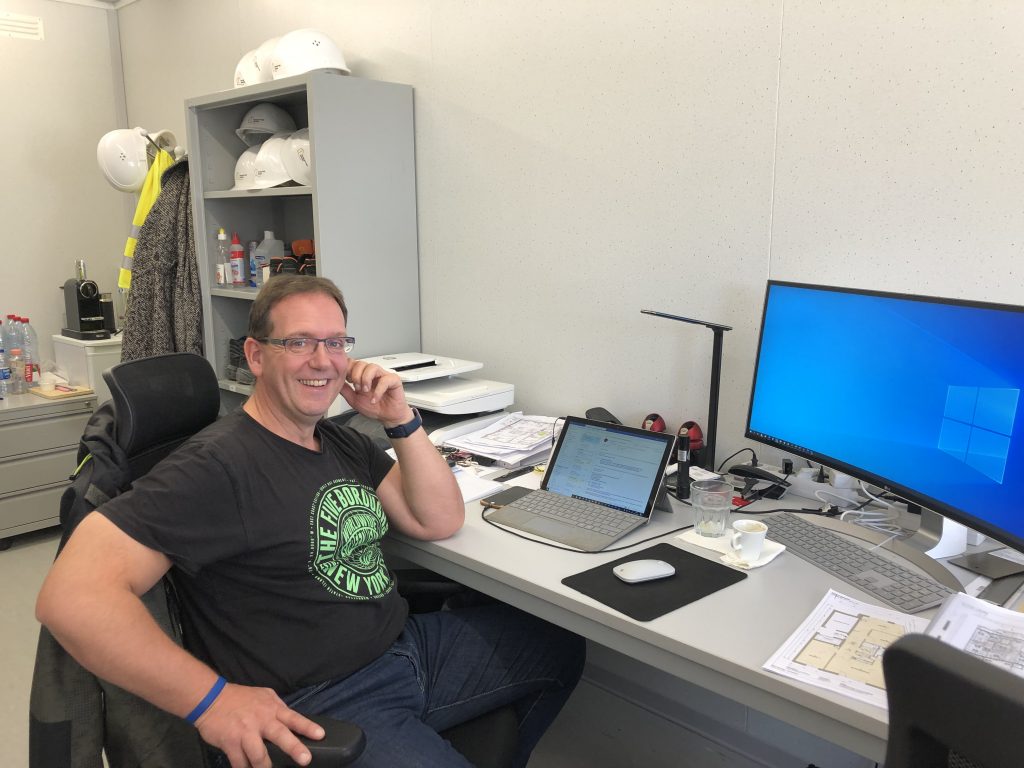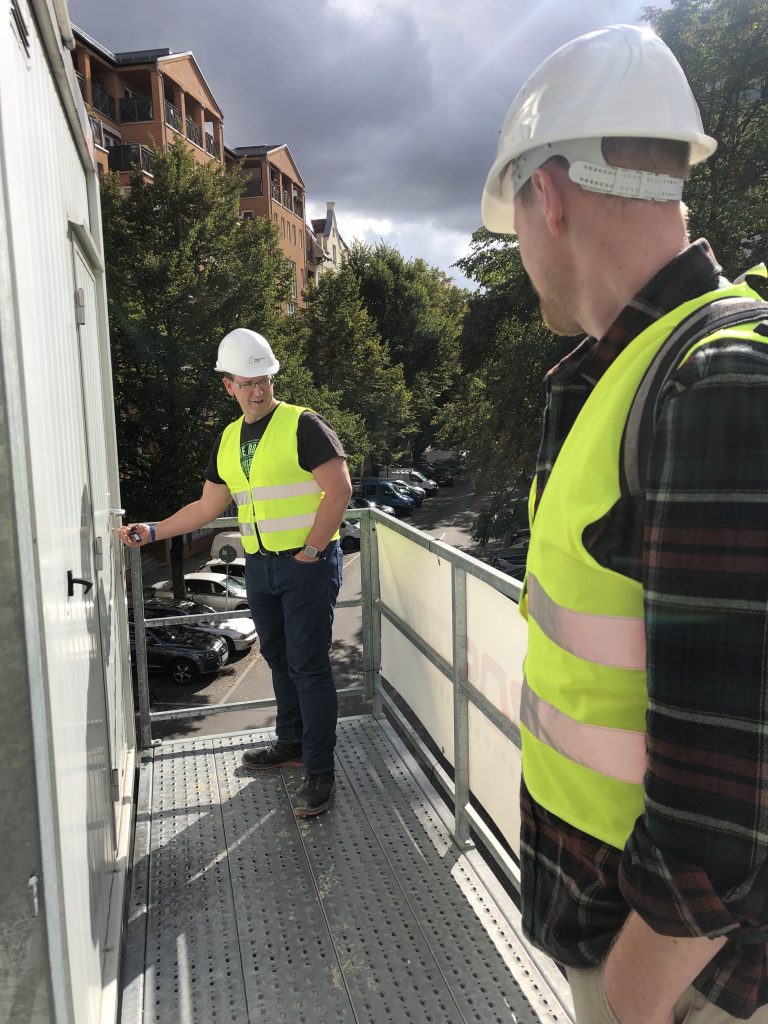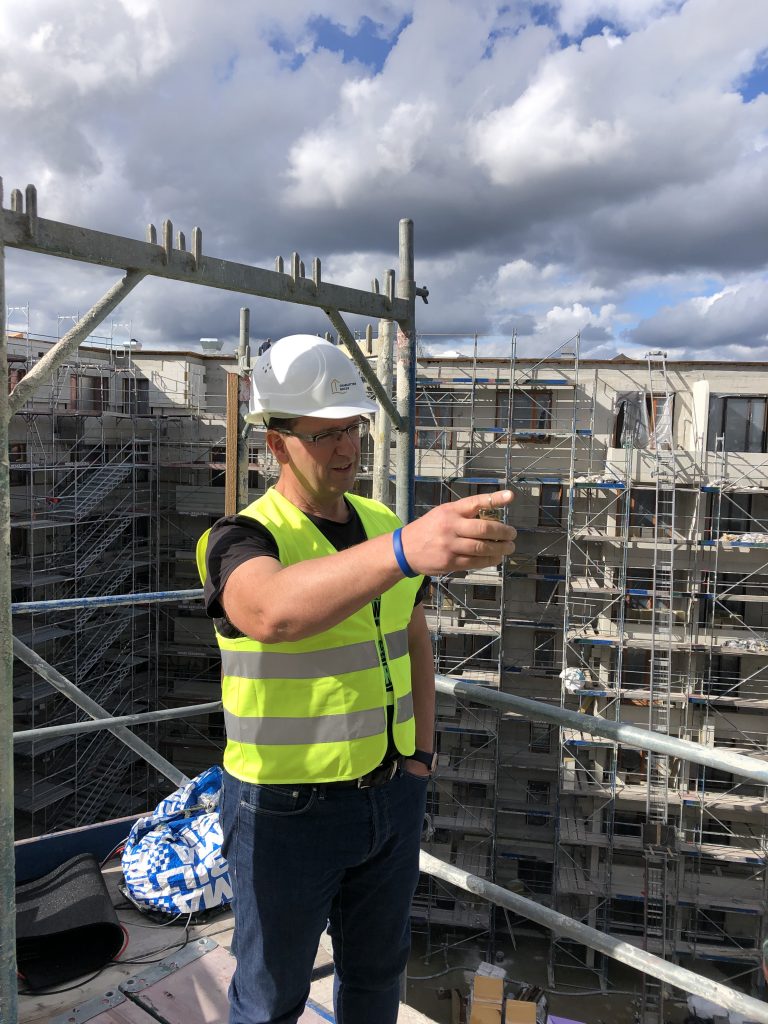Olaf Jäckel smiles and waves me in so invitingly that I immediately feel welcome in this uppermost of the stacked containers, the builder’s office. And this despite the fact that he is still sitting in a meeting: at his desk, online conference of course, but without a picture. And since someone else is speaking at the moment, he puts his microphone on mute and greets me winsomely: “Coffee?“
Apart from the seams between the wall panels and the angled profiles in the corners, it looks like a normal office: two desks across the corner, computers, shelves, a small refrigerator. A trail of sand on the floor testifies to the fact that work here doesn’t just take place at the fancy curved monitor. And the construction helmets on the shelf, like the glow-in-the-dark vests on the coat rack, remind us where we are: They all bear the Charlottenbogen logo.

The online meeting is over. “Owner’s meeting,” Olaf Jäckel explains, jumps up and shakes my hand warmly. After this official hello, he repeats his question: Coffee or espresso? Or cappuccino, with milk? The small capsule machine on the roll container can do almost anything.
Olaf Jäckel wears jeans and a loose T-shirt and looks like someone who doesn’t really want to spend his days at a desk. At least not only. He looks comfortable, but still like someone who really likes to tackle things himself. “Customer service, quality assurance construction” is what his business card says. So he’s there to make sure that everything is implemented in the interests of the customer, just as it says in the purchase contract.
The interaction between the parties involved in construction never runs completely smoothly. After all, the project is quite large and there are a lot of people at work. It’s normal for there to be a few grumbles here and there. But it’s good to have someone who has an eye on the big picture and takes care of any snags. Olaf Jäckel is one such person.
He talks to the relevant specialist companies, coordinates the individual trades, and mediates between the various parties when they are not thinking about it themselves. Many companies now come directly to him to voice their concerns. He then talks to the project management if there are problems somewhere and presents the important issues here.

Above all, he makes sure that the customers’ concerns are taken into account. And that they are informed in good time if, for example, something has to be done differently from what was agreed. This can always happen in the course of the process for a variety of reasons. After all, even with all our experience and careful work, some things only come up during implementation. Nothing wrong with that. But “we have to at least inform the customers. When communicating with customers, it’s really important to me that you’re open and honest with them,” he says firmly. Especially if the completion is delayed. “After all, people are adjusting, giving notice on their apartment, maybe needing a place at daycare,” he knows only too well. And he has experienced it quite differently in other companies. That regularly gave him a stomach ache, which is why he wanted to leave there as quickly as possible. When AMAG was still looking for someone, he happily followed Jens Rodenbusch here, whom he already knew from another company and held in extremely high regard.
However, he feels at home at AMAG above all because he has his construction division back. During his years in pure sales, he had missed it very much. After all, he is a craftsman by nature. One who gets down to work, as I said. His apprenticeship was actually as a roofer, from which he developed further and later wanted to become a master parquet layer. “That would have given me my title. But then they abolished the master craftsman requirement.” So he preferred to invest the money in further training. In the end, titles aren’t important to him at all; what’s important is the knowledge itself. “And you get that from experience. It’s the practice that does it, that’s priceless.”
After the roofing business, he worked for a while with a buddy in scaffolding construction, later became self-employed with his own business in the field of renovation of old buildings and continued to expand his portfolio from then on. Since he wanted to know a lot, he constantly attended further training courses: Building waterproofing, water, ventilation technology, statics, fire protection, building physics … “I found the static stories mega-interesting, so I took a lot of courses there.”
Today, he still doesn’t have a fancy title, but he does have a very broad knowledge of structural engineering. He simply sees when something goes wrong in the execution, knows the dependencies on the construction site. And he knows what is technically feasible. He can deal with people accordingly. And that often requires a sure instinct. After all, an apartment like this costs a lot of money. But Charlottenbogen is also a community project. In the end, people will live together in 164 apartments.
“We planned and optimized everything extensively beforehand,” he says. It’s just not right when buyers bring their own architectural experts and want everything to be completely different. To these humans it puts then gladly also times to the heart to concern itself rather with another object. After all, they should be happy with their apartment. In other companies, this would be unthinkable, but he can do it at Charlottenbogen. And he thinks it’s really great.
And what else? What is so special about Charlottenbogen for him? His eyes light up and he grins: “It’s simply a great project! The location, the diversity, the spaciousness of the houses, the green design in the inner courtyard … “What I find totally brilliant about the property is – of course: the waterfront location! Even if you have an apartment further back, you walk the three meters, grab a blanket and pack yourself directly on the shore, in the sun – that’s just really a blast.” And as a professional, the very different design of the buildings naturally appeals to him. “The architecture of Axthelm Rolvien, where everything is just made of glass, that had never been so present for me. Everything is very open and the design options are very nice,” he says happily.
And so he has no problem hanging on for an hour or two if he has to.
Nevertheless, he also enjoys his free time and is apparently just as diverse there: He loves riding his motorcycle (“All year round.”), but also likes to go climbing. Or scuba diving. And fishing … Sounds almost as if he can do almost anything. Like the small coffee machine in his builder’s office, in the top container.
